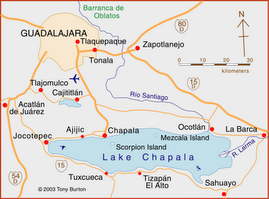 Even Chuy knows that sometimes living in a foreign land brings surprises!
Even Chuy knows that sometimes living in a foreign land brings surprises!
Any readers of this blog know that we love living in Mexico. After all, we can live a very comfortable life on a teacher's pension; the cost of living is very reasonable. The climate in this area of Mexico has been rated the second-best in the world, second only to a part of Kenya. The people are friendly and helpful. The culture is rich with good food, a wonderful craft tradition, and fiestas galore. And, in addition, we have a vibrant and interesting expatriate culture here with people from around the globe. Nevertheless, moving from the United States and into a culture where the infrastructure is not always up to the standards we are used to, where political corruption is common, where our Bill of Rights does not apply under Napoleonic Law, often requires patience and an "attitude adjustment." We have met people who, I think, want Mexico to be more like the US. They end up leaving because they'll never be happy. I think the key to being happy living here is to accept Mexico for what it is and learn to adjust to those things which are very different.
Perhaps the most obvious difficulty of living in a foreign country is the fact that many people do not speak any English. At our age, it's difficult to become fluent in another language. Of course, here near Lake Chapala, many Mexicans have learned enough English to make themselves understood. Yet, every day I run across people in shops and other businesses who speak little or no English. And, as foreigners everywhere experience, when native speakers speak to you in their own language, they speak very rapidly! My Spanish is "servicable," a euphemism for very rudimentary. When I speak Spanish here and sometimes butcher the correct pronunciation, the residents here, who are used to hearing bad Spanish, can usually figure out what I am trying to say. Of course, that leads to a false sense of competency. When we travel to other areas of Mexico, the native speakers sometimes have no idea what I am saying. I have mastered the art of asking people to "habla despacio, por favor," or speak slowly, please. This usually works, but sometimes I am caught facing a very nice Mexican who has no idea what I am trying to say, and vice versa. The other day I hadn't received my electric bill. Now, here in Mexico, that's no excuse for not paying your bill on time. And there's no grace period; if you don't pay by the due date, they'll cut off your power. So, not having a bill in hand, I went over to the CFE office in Chapala with one of my old bills so I could make a payment on my account. The very nice woman there spoke to me in mile-a-minute Spanish explaining that I couldn't pay at the window, but I had no idea why. She pointed to a sign which helped a bit and I finally was able to determine that I had to go into San Antonio Tlacapan, a town between Chapala and Ajijic, to pay the bill at a little grocery store, Super Laura. I tried to ask how I was supposed to pay a bill when I didn't have a bill to pay, to no avail. So, a bit bewildered, I drove over to San Antonio and found Super Laura. I walked into the store and showed her my old electric bill. The woman at the register smiled and pointed to another woman sitting at a card table in the back of the store. Surprisingly, she had a stack of bills, including ours. I paid the bill and asked if this arrangement was permanente? I think she said it was. So, next time I'll go there first, and hope we're using the same system. I still have no idea why they changed this procedure. But when in Rome...
As you may know, we have a very nice woman who cleans for us once a week. She came with the house, actually. She comes on Saturdays, now. Well, last Saturday, May 1, was apparently an important holiday, as our neighbor pointed out to us. He mentioned that, as a result, we had to either give Maria Elena a day off with pay or have her work and pay double. Now we only pay her 200 pesos, about $17 a week, so doubling her pay for the day was not a hardship. But the point is, we never know if we are doing things lawfully and correctly. We have to pay a Christmas bonus and vacation pay following an arcane formula, every year. And strange holidays pop up, and we are apparently supposed to know how to adjust the pay for these days. Then wehave the patron system. When you have someone in your employ, you become their parton. That apparently means that you agree to look out for them. When we go away, like we did last summer, we paid her regular wage, even though she wasn't working much, just so she wouldn't lose money. And if she is sick, we pay her. Sometimes when families suffer medical or other hardships, the patrons will help out with the expenses. Since Maria Elena works for us only one day a week and for others on other days, presumably the others share this responsibility, but we never know exactly what our responsibilities are or will be, for that matter. Of course, Maria Elena is wonderful and helps us navigate and find what we need. We are looking for a couple more equipal chairs for our terrace. I asked Maria Elena where I could buy a couple of chairs. She told me, in Spanish, that she would go to the store and ask for the price, because they would charge me a "gringo price." She's probably right. So she's going to find them, then we'll go over in our car and pick them up for a "Mexican price."
Another area of difference, when living in a foreign country, it our interaction with its legal system. Some of you may remember an early entry I wrote about being pulled over for a traffic violation when we first arrived here. Being a bit nervous, I wasn't sure how to handle this. The Mexican traffic officer offered to "pay the fine" for me for a mere 200 pesos. This was a shakedown, for if I had received a ticket and paid it promptly, it would have cost about 25 pesos. So the next (and only other time) I was stopped, I insisted on an actual ticket. The officer finally gave up and told me he was going to "let me off." But, it is unnerving. I've had friends who were threatened with having their car "impounded" unless they paid the mordida, which means "the bite" in Spanish!
Here's another legal example. Until recently, and I'm not sure exactly what has changed, you could be held liable for defaming someone if you spoke ill about them, whether the facts were true or not. This means, that we have to be extremely careful bad-mouthing anyone publicly. I, for example, had a bad experience with a doctor last spring, as you may remember. But I must be very careful not to speak badly about him as he could file a complaint against me and I could be arrested. Recently, a dispute occurred between gringos about the governance of their gated community. It became very bitter, and one side complained to the Mexican authorities about the other group of people. Surprisingly, the Mexican police came, in street clothes, and arrested several of these people in their homes and put them in a state prison until the truth could be sorted out. These people being arrested reportedly thought they were being kidnapped. The same thing can happen if you are involved in a motor vehicle accident where someone is injured. The police will take everyone to jail until everything is sorted out. Innocent until proven guilty is a US Constitutional concept which may not necessarily apply here.
One of the most common adaptations has to do with truthfulness and time. In the US, we value punctuality and honesty. Here, neither is always foremost in the minds of Mexicans when dealing with us (or with each other, for that matter). I've written about the punctuality issue before. Business people will promise to show up or have something for us at a certain date and time, yet, often, they do not deliver in a timely way. Anyone who lives here just has to accept this. Complaining about it does no good. As a result, I have found my own sense of time has been altered. After all, what's the rush? It's not that they won't do it, it's that they will do it when they get to it. And this brings us tot he truthfulness issue. I suspect sometimes when they promise something, they know they really won't be able to meet the deadline they've promised. It's simply that telling us they will makes us happy at the moment, which is always their goal, it seems. Mexicans will often give directions even if they are not sure of the facts because they want to be helpful, courteous, and not disappoint. The accuracy of the information is not as important as pleasing people at the moment. It's just a cultural difference which drives Americans crazy sometimes. Consequently, we have to just account for a margin of error in information we receive from Mexican business people. The Mexicans are used to this tradition, we are not.
So, there are adjustments whenever you move to a foreign country. Maybe I'll discuss others in my next post. Of course, despite these issues with which we must accept with equanimity, we have a wonderful experience here and have adapted to the changes willingly.
Here is an interesting piece Tom Friedman wrote for yesterday's New York Times about Mexico today:
This is a strange time for U.S.-Mexico relations. The Mexican government just issued a travel advisory warning Mexicans about going to Arizona — where they could get arrested by the police for no reason — and the U.S. government just issued a travel advisory warning Americans about going to northern Mexico — where they could get shot by drug dealers for no reason. Meanwhile, Wal-Mart de Mexico is expected to open 300 new stores in Mexico this year, thanks to growing Mexican demand for consumer goods. And Mexico’s drug cartels will probably open just as many new smuggling routes into America thanks to our growing demand for marijuana, cocaine and crystal meth.
We take the Mexican-American relationship for granted. But with the drug wars in Mexico turning into Wild West shootouts on city streets and with our own immigration politics turning more heated, what’s happening in Mexico has become much more critical to American foreign policy and merits more of our attention. Mexico is not Afghanistan, but it also has not become all that it hoped to be by now. Something feels stalled here.
Three groups are now wrestling to shape Mexico’s future. I’d call them “the Narcos,” “the No’s” and “the Naftas.” Root for the Naftas.
The Narcos are the drug cartels who are now brazenly attacking each other in turf wars and challenging the state for control of towns. The success of U.S. and Colombian efforts to interdict drug trafficking through the Caribbean and north from Colombia have pushed the cartels to relocate their main smuggling up through the spine of Mexico. President Felipe Calderón is bravely trying to take them on, but the Narcos have bigger guns than the Mexican Army — most smuggled in from U.S. gun stores.
The Mexican daily Reforma reported last week that “the recent wave of insecurity in Mexico has made businesses related to public security, automobile armoring, insurance, satellite positioning systems and bulletproof vests grow at an unprecedented level.” Companies in Mexico, it added, now invest between 1 percent and 3 percent of their sales in security. In 2006, it was just 0.5 percent.
While the Narcos are the rising bad-news story here, the rising good-news story is Mexico’s burgeoning middle class — sort of. Mexico has two middle classes. One lives off the oil pumped and exported by the state oil company Pemex, which funds 40 percent of the government’s budget. That budget sustains a web of salaries and subsidies to teachers’ unions, national electricity company workers, farmers unions, state employees and Pemex workers.
I call this group the No’s because they are the primary force opposing any reform that would involve privatizing state-owned companies, like Pemex, opening the oil or electricity sectors to foreign investors or domestic competition, or bringing best-practices and accountability to Mexican schools, where union control has kept Mexico’s public education among the worst in the world.
Fortunately, though, there is another rising middle class here, which the Mexican economist Luis de la Calle describes as the “meritocratic middle class.” It’s people who came from the countryside to work in new industries spawned by Nafta. This rising middle class has a powerful aspiration to dig out of poverty. Mexico has standardized school achievement tests, so you can see how well schools in one neighborhood stack up against another. Some of the best results, said de la Calle, can now be found in small private schools in poor Mexico City neighborhoods where the Naftas reside.
What is also striking, he added, are the names of the private schools in some of these poor Mexico City districts — like Iztapalapa: “They are called John F. Kennedy, Abraham Lincoln, Isaac Newton, Winston Churchill, Carlos Marx, Van Gogh and Instituto Wisdom.” Why such names? They are appealing to the aspirations of Mexicans, about 40 percent of whom live below the poverty line but 75 percent of whom identify themselves as “middle class” in polls.
De la Calle also studied the top 50 Mexican baby names in 2008. The most popular for girls, he said, included “Elizabeth, Evelyn, Abigail, Karen, Marilyn and Jaqueline, and for boys Alexander, Jonathan, Kevin, Christian and Bryan.” Not only Juans. “We have two middle classes,” he said. “One comes from teachers’ unions and Pemex and power companies, who milk the Mexican government. These are the middle-class conservatives, and they want to preserve the status quo. But there is a rising and far larger Mexican middle class coming up from the bottom who send their kids to the Instituto Wisdom and who have a meritocratic view of the world.”
So here’s my prediction: When Mexico’s steadily falling oil production meets its rising meritocratic middle class, you will see real political/economic reform here. That is when the No’s will no longer have the resources to maintain the status quo, and that is when the Naftas from the Instituto Wisdom will demand the reforms that will enable them to realize their full potential.
 Even Chuy knows that sometimes living in a foreign land brings surprises!
Even Chuy knows that sometimes living in a foreign land brings surprises! 


































































1 comment:
О! هذا حل المشكلة حقا لي ، شكرا لك!
Post a Comment